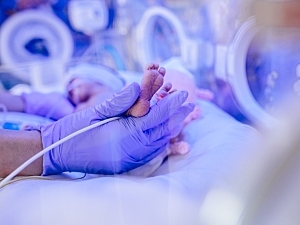Having an infant hospitalized in the neonatal intensive care unit (NICU) is a stressful time for families. Up to 50% of parents with very preterm infants experience elevated depressive and anxiety symptoms during their child’s hospitalization. These symptoms can go on to impact the infant and family long after the baby has been discharged from the hospital.
While efforts have been made to assess parents’ mental health and to refer them to services after NICU discharge, hospitals have been challenged to ensure appropriate referrals and delivery of services take place during the infants’ hospitalization.
Brigham and Women’s Hospital is changing that paradigm with its new Parent Mental Health (PMH) Program. The program is designed to provide timely and consistent mental health services for parents and caregivers during an infant’s hospitalization.
The multidisciplinary program was created by Cindy H. Liu, PhD, director of the Developmental Risk and Cultural Resilience Laboratory, and Leena P. Mittal, MD, director of the Division of Women’s Mental Health. The two have a history of collaborating to address issues surrounding stress and mental health in families.
Stress in the NICU and Beyond
According to Dr. Liu, the early bonding process between parents and their baby is integral to the well-being of the entire family. In the case of NICU babies, a parent’s mental stress can start immediately after delivery, the time when crucial family bonding usually begins.
“Parents may not even get a chance to hold their baby before the infant is whisked away to the NICU,” she says. “This early separation, coupled with unknowns around their baby’s health, can lead to anxiety, depression and other mental health concerns.”
Dr. Mittal adds that the mother is already at risk for these issues due to hormonal and physical shifts that take place during pregnancy and postpartum. She says the additional stressor of admission to the NICU can further amplify that elevated risk.
The parent/child separation and elevated mental health symptoms can contribute to poor parent-child interactions post-discharge. For example, parents may have a harder time reading their baby’s cues to determine what they need, want or feel.
“If the parent is tired, depressed or anxious, they can become frustrated if they can’t calm their baby, for example,” Dr. Liu says. “In turn, they may perceive that their baby is more challenging than they actually are or that they aren’t good parents. This lack of confidence in their parenting ability further reinforces mental health symptoms.”
“If left untreated, conditions like depression and anxiety can increase risk for complications in future pregnancy or during times of hormonal fluctuation,” Dr. Mittal says. “Parents can end up with acute stress disorder, which can affect all domains of functioning, from parenting and homemaking to professional and social.”
Over time, parents’ mental health issues can pose a risk to the child’s long-term cognitive, social, emotional and/or self-regulatory abilities, according to Drs. Liu and Mittal.
PMH Program Screens Parents in the NICU
The PMH Program is embedded in the Smith Family NICU, the Brigham’s 66-bed Level III NICU. As part of the program, team members assess parents for mental health needs using a universal screening process that helps identify those who could benefit from short-term contact with mental health providers while their baby is in the NICU.
“Parents don’t want to leave their baby’s side in the NICU, which can make it difficult to connect them with mental health services in a timely fashion,” Dr. Mittal says. “That’s why it’s important to bring the services directly to them, especially during an acute crisis.”
The program’s mental health interventions include cognitive behavioral therapy and acceptance-based therapy to reduce distress during the NICU hospitalization and to promote caregiver self-efficacy and readiness for discharge. While these interventions are conducted right in the NICU, referrals to outside mental health providers are also made as needed, including referrals to providers close to the family’s home for ongoing care.
Future plans for the program include offering the screener to all NICU families, providing group psychotherapy and following patients after the NICU to determine their long-term trajectory.
“As a researcher, I’m excited about the possibilities of following families over time as we continue to build the program’s infrastructure,” Dr. Liu says. “Ultimately, we’d like to know if the interventions we provide right after birth make a difference in the longer term.”
Interdepartmental Support for Family-centered Care
Drs. Liu and Mittal developed the PMH Program alongside a working group of Brigham experts from psychiatry, neonatology, social work, psychology and program administration. Support from leadership across departments was crucial and readily provided.
Carmina Erdei, MD, is part of the group. As an attending neonatologist, she specializes in the medical and neurodevelopmental care of high-risk infants. She has witnessed firsthand the important role the family plays in their baby’s care and recovery.
“Parents are a critical ingredient in their infants’ success and recovery,” she says. “That’s why it’s essential to consider and address their needs in an interdisciplinary way so they, along with their baby, can get the necessary support to thrive during a challenging time for the entire family.”
“There are many components and perspectives involved in serving families,” Dr. Liu adds. “At the Brigham, everyone has a shared vision about supporting families and will problem solve to ensure the entire family is set up for optimal outcomes after leaving the NICU.”
The program also has an upside for the mental health of clinicians. “The PMH Program provides relief and assurance, not just to families, but also to NICU providers, who have long been engaged in efforts to support distressed and grieving parents,” Dr. Liu concludes.
